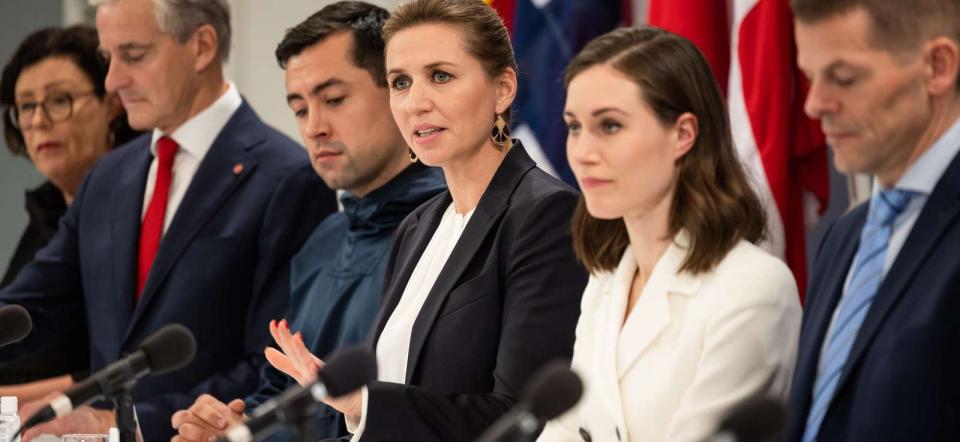We turn back the time to 11 March 2020.
In the middle of the day, the National Operational Staff (NOST) is gathered at the National Police in Denmark. Around the table are representatives from all the key authorities in the coordinating crisis management apparatus in Denmark.
The Chief of Staff enters the room and informs those present that the government wants to pull the big lever. The COVID-19 pandemic is now a reality. A few hours later, the Danes in their living rooms receive the news at a large press conference: The whole country is shutting down.
"Each sector represented in the room was actually responsible for deciding what their own sector should do. Here in this room, the decentralised sector met with the central sector in the form of the Chief of Staff, who came directly from a meeting with the heads of department in the ministries and presented a complete roadmap for the total shutdown of the country. The sector representatives were basically just told what each of them had to do. For Denmark, this was the watershed moment when the principle of sector responsibility was effectively cancelled."
These words come from Rasmus Dahlberg from Forsvarsakademiet in Denmark. He leads the research project "Reinterpreting Sector Responsibility in Nordic Crisis Management after COVID-19". Researchers from Denmark, Norway and Sweden are investigating how the handling of the COVID-19 pandemic affected the Nordic crisis management principle of sector responsibility. When the pandemic struck, the decentralised principle of preparedness and crisis management was put to its most dramatic test yet.
"Every once in a while, you have to re-evaluate the fundamental principles. Not necessarily to change them, but to give them an overhaul. It's one thing what legislation and crisis management plans say about the sectoral responsibility principle - it's another thing how they are interpreted in practice. The handling of the pandemic was one big societal experiment, and it gives us the opportunity to look at the sector responsibility principle at a time when it was under heavy pressure," says Rasmus Dahlberg.

The Scandinavian countries' sector responsibility principle
Basically, a society can be said to have either a sector responsibility principle or a centralised principle where one authority is solely responsible for societal security. Historically, the latter has been typical of Central and Eastern European countries, for example in the former East Germany.
In Scandinavia, we have built our crisis management around the sector responsibility principle. This means that responsibility for societal security is divided between sectors such as police, health, energy, transport and defence. In recent years, the energy sector has played an increasingly important role in the overall threat situation, as has the transport sector and thus supply lines.
In Sweden, the ultimate responsibility for emergency preparedness coordination lies with the Minister for Civil Defence, Carl-Oskar Bohlin, who recently gave a controversial speech to the Swedish population about the threat of war. In Norway, crisis management falls under the Minister of Justice and Public Security, while in Denmark it falls under the Minister of Defence.
Denmark stood out from Norway and Sweden
All Scandinavian countries have organised the management of societal security according to the sector responsibility principle and have comparable systems that look similar at first glance, even though Sweden only talks about the "responsibility principle". But the similarities quickly disappear if you ask Rasmus Dahlberg.
"It's interesting. We see differences between Denmark, Norway, and Sweden during the pandemic when it came to the degree of centralised and decentralised crisis management. In the first period of the pandemic, Sweden was the country that went the furthest in decentralised management. Because the pandemic started as a health crisis, the health authorities had ownership of the crisis management, and this continued well into the pandemic, what we call the Anders Tegnell model."
In other words, the decision-making power remained with the health authorities in Sweden, while the government stayed out of the actual crisis management. At the other end of the scale is Denmark, with highly centralised management and a prime minister who stepped up and took the lead - for example, by announcing the shutdown of the country at a press conference on the evening of 11 March 2020. In other words, she was deep in the engine room of crisis management, while Norway was midway between Denmark and Sweden," explains Rasmus Dahlberg.
"In practice, this means that it was in Denmark that the sector responsibility principle was challenged the most. Previous principles of crisis management suddenly changed with lightning speed during the spring of 2020. Several ad-hoc institutional measures were taken, which meant that everything became much more politically and centrally controlled. We didn't see the same thing happen in Sweden and Norway. We don't yet know why, but perhaps the personality of the Danish prime minister played a role. Are you a crisis manager or a bureaucrat? Do you enjoy leading during a crisis and being in front of the people, or do you prefer to leave it to the civil servants?" Rasmus Dahlberg asks and adds:
"In reality, our entire project is about uncovering how Norway, Sweden and Denmark handled the societal security crisis that was the pandemic, what this meant for each country's interpretation of the sector responsibility principle, and - most importantly - what we can learn from it."
How they do it
The researchers in the project have three parameters in mind:
1. The formal: What does the law say about the sector responsibility principle and what is the historical basis for it?
2. The institutional: How have the three Scandinavian countries organised the sector responsibility principle?
3. Interpretation: How is the principle of sector responsibility interpreted and how does it materialise in practice?


